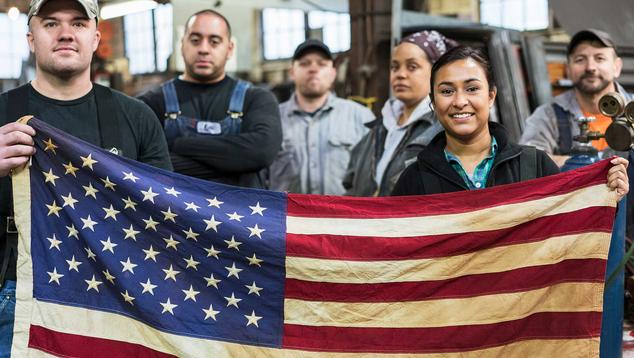Story Highlights
- 43% are extremely and 26% very proud to be Americans
- Democrats more likely to express pride than a year ago
- Democratic pride still below where it was before 2017
WASHINGTON, D.C. -- U.S. adults' pride in being Americans has ticked up after hitting a record low last year, but it remains well below the levels seen before 2017. The combined 69% of Americans who are now "extremely" (43%) or "very proud" (26%) to be Americans is in line with what Gallup measured in 2019. Most of the recovery in the past year is seen in the percentage who say they are "very proud."

Line graph. How proud U.S. adults are to be Americans. The combined 69% who are extremely or very proud to be Americans this year is up from 63% a year ago, but lower than 75% in 2017, 85% in 2013 and 92% in 2002.
Before 2018, no less than three-quarters of U.S. adults said they were extremely or very proud to be Americans, with majorities saying they were extremely proud. Both figures have declined at least slightly each year since then, reaching new lows last summer amid widespread racial justice protests, the coronavirus pandemic and a divisive presidential election campaign.
U.S. national pride peaked in the years after the 9/11 terrorist attacks, with at least nine in 10 Americans between 2002 and 2004 saying they were extremely or very proud, including roughly 70% who were extremely proud.
The current results are based on a June 1-18 survey. In addition to the combined 69% of U.S. adults who are extremely or very proud, 20% say they are "moderately proud," 6% are "only a little proud," and 5% are "not at all proud." The combined 11% only a little or not at all proud is down from 21% last year.
Partisans' National Pride Heading in Different Directions
Last year, both Republicans and Democrats showed declines in their national pride compared with 2019.
For Republicans, the change was mostly in the percentage who were extremely proud, which fell from 76% to 67%. This year, 64% of Republicans are extremely proud and 23% are very proud.
Among Democrats, the percentage who were extremely proud held steady last year, but there was a drop in the percentage who were very proud. The percentage of Democrats who now say they are very proud is back to the 2019 level, but more Democrats now than in either 2019 or 2020 say they are extremely proud.
Independents' pride figures have been relatively steady over the past three years.
| 2019 | 2020 | 2021 | |
|---|---|---|---|
| % | % | % | |
| Republicans | |||
| Extremely proud | 76 | 67 | 64 |
| Very proud | 19 | 21 | 23 |
| Extremely/Very proud | 95 | 88 | 87 |
| Independents | |||
| Extremely proud | 41 | 41 | 40 |
| Very proud | 26 | 22 | 25 |
| Extremely/Very proud | 67 | 63 | 65 |
| Democrats | |||
| Extremely proud | 22 | 24 | 31 |
| Very proud | 29 | 18 | 31 |
| Extremely/Very proud | 51 | 42 | 62 |
| Gallup | |||
Even with the increase in the percentage of Democrats who are extremely proud this year, it remains well below where it was before 2018. Much of that decline in Democratic pride could have been related to their negative feelings about then-President Donald Trump and his domestic and international policies. However, even with a Democratic president in office, the 31% of Democrats who are extremely proud in 2021 is well below the 45% measured in 2016, the last year a Democrat was president.
Republicans have been more likely than Democrats to say they are extremely proud each year Gallup has asked the question. The 64% of Republicans who are extremely proud this year matches the low in the trend, from 2001.
Independents, like Democrats, have recently been less likely to say they are extremely proud to be Americans, with roughly four in 10 saying so in each of the past four years.

Line graph. Trend from 2001-2021 in the percentage extremely proud to be an American, by political party. The current (2021) 64% of Republicans who are extremely proud matches the historical low, while 40% of independents and 31% of Democrats are extremely proud.
Generational Differences in National Pride Evident
Younger Americans are much less likely than their older peers to express pride in the country. Currently, half of Americans younger than age 35 are proud to be Americans, including 26% who are extremely proud. In contrast, more than seven in 10 Americans between the ages of 35 and 54, and eight in 10 Americans aged 55 and older, are proud.
| 18-34 years old | 35-54 years old | 55+ years old | |
|---|---|---|---|
| % | % | % | |
| Extremely proud | 26 | 43 | 53 |
| Very proud | 24 | 28 | 27 |
| Moderately proud | 31 | 19 | 15 |
| Only a little proud | 10 | 3 | 4 |
| Not at all proud | 8 | 6 | 1 |
| Gallup, June 1-18, 2021 | |||
In past years, there were only modest age differences. For example, in 2005, 10 percentage points separated the youngest (56%) and oldest adults (66%) in extreme pride, compared with a 27-point age gap today.
Thus, the decline in national pride seen today appears to result partly from younger generations being less likely to say they are proud of their country than the older generations who preceded them.
The poll finds modest racial differences, with 72% of White Americans and 63% of Non-White Americans saying they are extremely or very proud to be Americans. However, White Americans are much more likely to say they are extremely proud (49%) than very proud, while Non-White Americans split about evenly between the two categories (30% extremely proud, 33% very proud).
Bottom Line
Patriotic fervor in the U.S. has recovered from its 2020 low point but remains well below where it was over the past two decades, even before the 9/11 rally. Absent a similar event, it is not certain that national pride will return to its pre-2017 levels, given emerging generational differences in patriotism and perhaps a greater link than in the past between the party of the president, one's own partisanship, and how one feels about the country.
Even near its low point in intensity, the vast majority of Americans still express at least a moderate degree of pride in their country, with only about one in 10 U.S. adults saying they have little or no pride.
To stay up to date with the latest Gallup News insights and updates, follow us on Twitter.
View complete question responses and trends (PDF download).
Learn more about how the Gallup Poll Social Series works.




